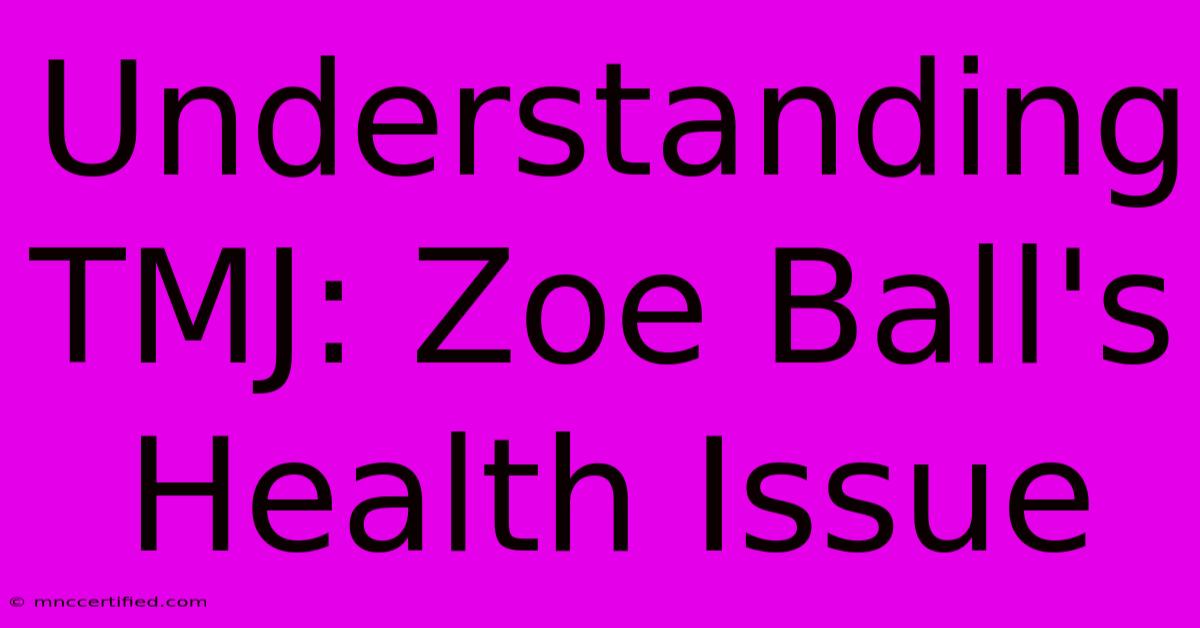Understanding TMJ: Zoe Ball's Health Issue

Table of Contents
Understanding TMJ: Zoe Ball's Health Issue
Temporomandibular joint (TMJ) disorder, a condition affecting the jaw joint, has recently gained attention due to its impact on public figures like Zoe Ball. This article explores TMJ, its causes, symptoms, diagnosis, and treatment, shedding light on this often-overlooked health concern.
What is TMJ Disorder?
TMJ disorder, or temporomandibular joint dysfunction (TMD), encompasses a range of problems affecting the temporomandibular joint (TMJ), the joint connecting your jaw to your skull. This joint allows you to speak, chew, and yawn. When this joint becomes inflamed or damaged, it can cause significant pain and discomfort.
The Mechanics of the TMJ: A Complex Joint
Understanding the complexity of the TMJ is key to understanding TMD. The joint is comprised of a disc of cartilage, ligaments, muscles, and bones working in concert. Any disruption to this intricate system can lead to dysfunction.
Causes of TMJ Disorder
The exact cause of TMJ disorder is often difficult to pinpoint, but several factors are implicated:
- Injury: A blow to the jaw, whiplash, or even an unexpected fall can injure the TMJ.
- Arthritis: Conditions like osteoarthritis and rheumatoid arthritis can damage the joint's cartilage and cause inflammation.
- Grinding or Clenching Teeth (Bruxism): This unconscious habit puts significant stress on the jaw muscles and joint. Stress is often cited as a contributing factor to bruxism.
- Jaw misalignment: An improper bite, or malocclusion, can strain the TMJ.
- Genetics: Some individuals may be genetically predisposed to TMJ disorders.
Common Symptoms of TMJ
Symptoms can vary widely in severity and type, but common signs of TMJ disorder include:
- Jaw pain: Pain in the jaw joint, often accompanied by tenderness to the touch.
- Headaches: TMJ disorders can lead to headaches, especially tension headaches and migraines.
- Earaches: Pain in the ear, often mistaken for an ear infection.
- Neck pain: Pain and stiffness in the neck muscles.
- Facial pain: Pain in the face, particularly around the cheeks and temples.
- Clicking or popping sounds: Audible clicks or pops when opening or closing the mouth.
- Limited jaw movement: Difficulty opening or closing the mouth fully.
- Difficulty chewing: Pain or discomfort when chewing.
Diagnosis and Treatment of TMJ Disorder
Diagnosis typically involves a physical examination by a dentist or doctor specializing in TMJ disorders. Imaging techniques like X-rays or MRIs may be used to confirm the diagnosis and rule out other conditions.
Treatment options depend on the severity of the condition and can range from conservative approaches to surgical intervention:
- Over-the-counter pain relievers: NSAIDs like ibuprofen can help manage pain and inflammation.
- Muscle relaxants: These can help alleviate muscle spasms associated with TMJ.
- Mouth guards or splints: These devices help protect the teeth and prevent grinding or clenching.
- Physical therapy: Exercises and stretches can help improve jaw mobility and reduce pain.
- Stress management techniques: Techniques like yoga, meditation, or biofeedback can help manage stress, a potential contributor to bruxism.
- Surgery: In severe cases, surgery may be necessary to repair or replace the damaged joint.
Zoe Ball and TMJ: A Public Figure's Experience
Zoe Ball, a prominent British TV and radio personality, has publicly discussed her struggles with TMJ. Her experience highlights the impact this condition can have on daily life and the importance of seeking professional help. While specific details of her diagnosis and treatment remain private, her openness raises awareness about TMJ disorder.
Conclusion: Seeking Help for TMJ
TMJ disorder can significantly impact quality of life, but effective treatments are available. If you experience any of the symptoms described above, it's crucial to consult a healthcare professional for a proper diagnosis and treatment plan. Early intervention can often prevent the condition from worsening and improve long-term outcomes. Remember, seeking help is a sign of strength, not weakness. Don't let TMJ control your life; take control of your TMJ.
Keywords: TMJ, temporomandibular joint disorder, TMD, jaw pain, headache, earache, neck pain, facial pain, clicking jaw, Zoe Ball, bruxism, stress, jaw misalignment, malocclusion, treatment, diagnosis, mouth guard, splint, physical therapy, surgery, osteoarthritis, rheumatoid arthritis.
Note: This article is for informational purposes only and does not constitute medical advice. Always consult with a qualified healthcare professional for any health concerns or before making any decisions related to your health or treatment.

Thank you for visiting our website wich cover about Understanding TMJ: Zoe Ball's Health Issue. We hope the information provided has been useful to you. Feel free to contact us if you have any questions or need further assistance. See you next time and dont miss to bookmark.
Featured Posts
-
Ishes Plan What Needs Doing
Nov 29, 2024
-
Can Lampard Redeem Himself At Coventry
Nov 29, 2024
-
Thanksgiving 2024 Newsom Proclamation
Nov 29, 2024
-
Hole In One Insurance Reviews
Nov 29, 2024
-
Non Owners Insurance Colorado
Nov 29, 2024